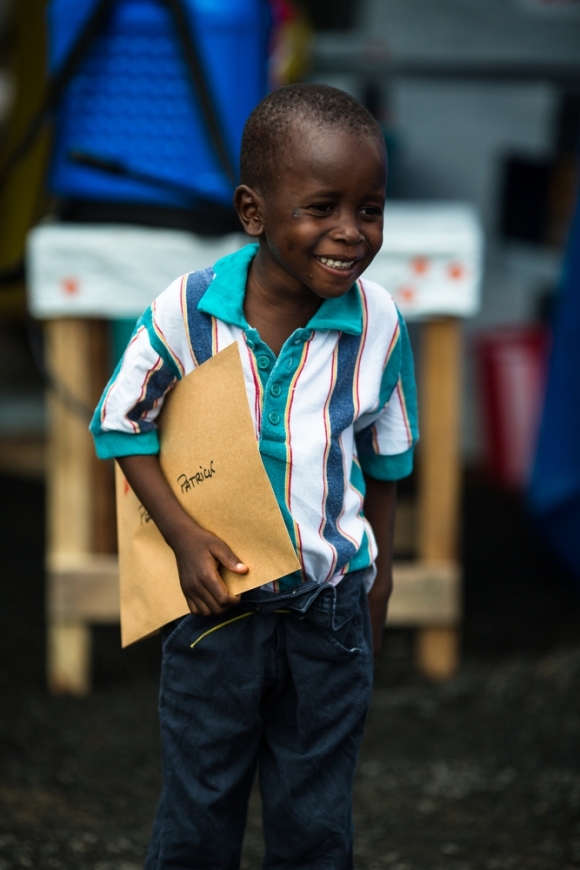This morning when I googled “local response” + “ebola”, here’s some of the headlines I found:
Christie activates statewide New Jersey Ebola preparedness plan
Florida: County and hospitals prepare for Ebola
As KU Hospital tests patient with Ebola-like symptoms, Lawrence agencies coordinate response
Denton City Council to be briefed on virus response
Ohio residents fear Ebola precautions could prompt panic

Not exactly what I was looking for. With all this drummed-up fear and stereotypes and prejudice flying around, I guess it’s easy for Americans to miss that Nigeria has been declared ebola-free, as was Senegal on Friday. And it’s easy to miss stories of people fighting the disease, like survivor Alhassan Kemokai in Sierra Leone who caught it while caring for his ailing mother, independent ambulance workers in Monrovia, or 6-year-old Patrick Poopel (pictured) whose smile who the only thing left that is infectious. Nursing student Fatu Kekula saved her father, mother and sister by inventing her own protective gear from trash bags. Apparently international aid workers heard are now teaching her “trash bag method” and to others who can’t get into hospitals.
This is more of what I was looking for, but these stories are unfortunately often hard to find. So I thought I’d share a few others on the local response to Ebola that I’ve been collecting since the outbreak hit the international media – please share any others in the comments:
- Making Sure We Give Credit Where It’s Due in the Ebola Outbreak, by Ashoka Mukpo
- The Hidden Heroes Of Liberia’s Ebola Crisis, by Jina Moore
- Ebola must be fought from the grassroots, by David Norman and Saran Kaba Jones
- The Rain after the Drought: Ebola, International Assistance and Community Initiatives in Liberia, by Charles Lawrence
- The West ignores the stories of Africans in the middle of the Ebola outbreak, by Ishmael Beah
- Ending Ebola: Weak Systems, or Strong Communities?, by James Fofanah
- Liberian Ebola Survivors Return to Help the Sick, by Heidi Vogt
- Ebola: the story of the Sierra Leone diaspora response that no one is telling, by Katherine Purvis
- Ebola: A new way to learn what’s going on from experts, journalists, and locals, by Karen Eng
- The greatest coping strategy is helping others: a conversation with Liberian activist B. Abel Learwellie, by Bryan Farrell
- Sierra Leone’s Ebola battle is being led by local talent that deserves our support, by Tom Dannatt
- The Answer to Ebola: a Funder Makes the Case for Community-Driven Action, by Libby Hoffman
Is Ebola in West Africa due to a “crisis of governance” or “the scourge of inequality” or “the ugly face of a global aid system that is broken“? These questions are an abstraction to those who are facing sickness and suffering this very day.
Malonga Miatudila, MD, who was part of the first team that dealt with Ebola first in 1976, describes how they contained the disease without the knowledge we have today: “Engage with communities. Give them the leadership of the fight…International experts are there to support local communities, and not to substitute.”
Here’s what you can do:
- If you want to give to local efforts, see GlobalGiving and the Ebola Survival Fund.
- Eighty-six community-based groups in Liberia have received funds via the Gbowee Peace Foundation Africa.
- Unfortunately this Indiegogo campaign by 5 grassroots organizations in Sierra Leone didn’t meet their goal, but you can still be in contact with them directly via email.
- Join AfricaResponds.org for a launch and Twitter discussion on Wednesday, Oct. 22, 2014 at 10am EST. Join the conversation with #UnitedAgainstEbola and #AfricaResponds hashtags.
- Diaspora, share how you’re responding to ebola here.
- Help provide hot meals to hospitalized patients and frontline healthcare workers in Ebola treatment centers in Sierra Leone.
- Check out the latest from journalists both professional and citizen on www.eboladeeply.org.
“When I was a boy and I would see scary things in the news, my mother would say to me, “Look for the helpers. You will always find people who are helping.” ~Fred Rogers
Look for the helpers. Reach out. Invest in those that are there for their communities, whether outside funding is available or not.

Pingback: The stories still hard to find: The local responses to Ebola | Ebola Stories
Amen! That’s why I created http://ebolastories.wordpress.com and http://storylearning.org/ebola/ to highlight local voices & wisdom too…
More citizen journalism from Sierra Leone here: http://ebola.onourradar.org
Great article! We see local leaders responding every day! bit.ly/step2ebolaresponse and thanks for posting the great piece mentioning Archie! http://www.how-matters.org/2014/10/29/west-africans-are-not-powerless-against-ebolaand-neither-are-we/
* bit.ly/steps2ebolaresponse
Pingback: Ebola: the Generalized Lie | Africa Freak Blog
Check out this three-part series in Forbes exploring the efforts and highlight the work that Africans are undertaking to curb the spread of the Ebola virus: http://www.forbes.com/sites/faraigundan/2014/10/28/liberia-how-africa-and-africans-are-responding-to-the-ebola-crisis/